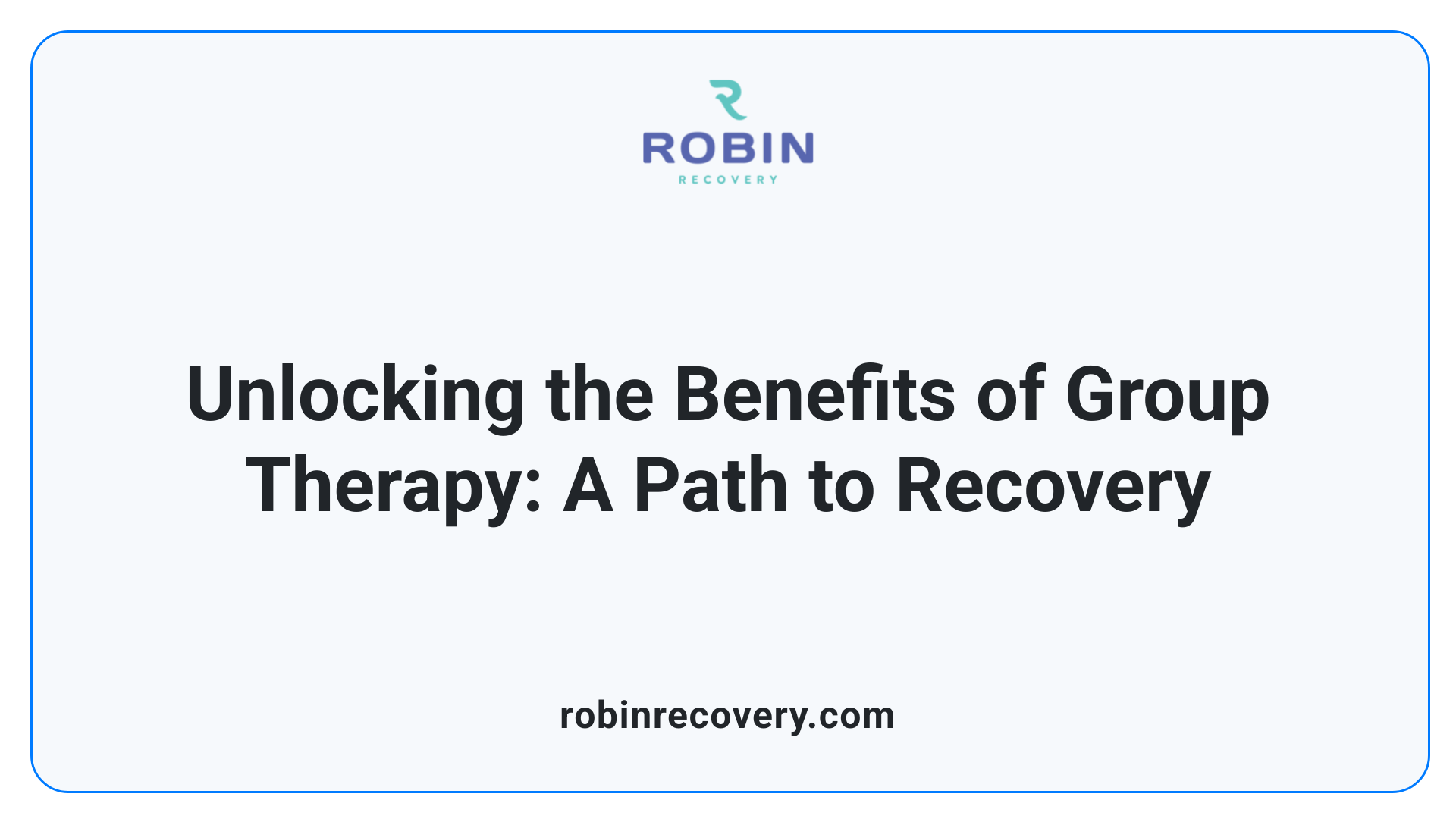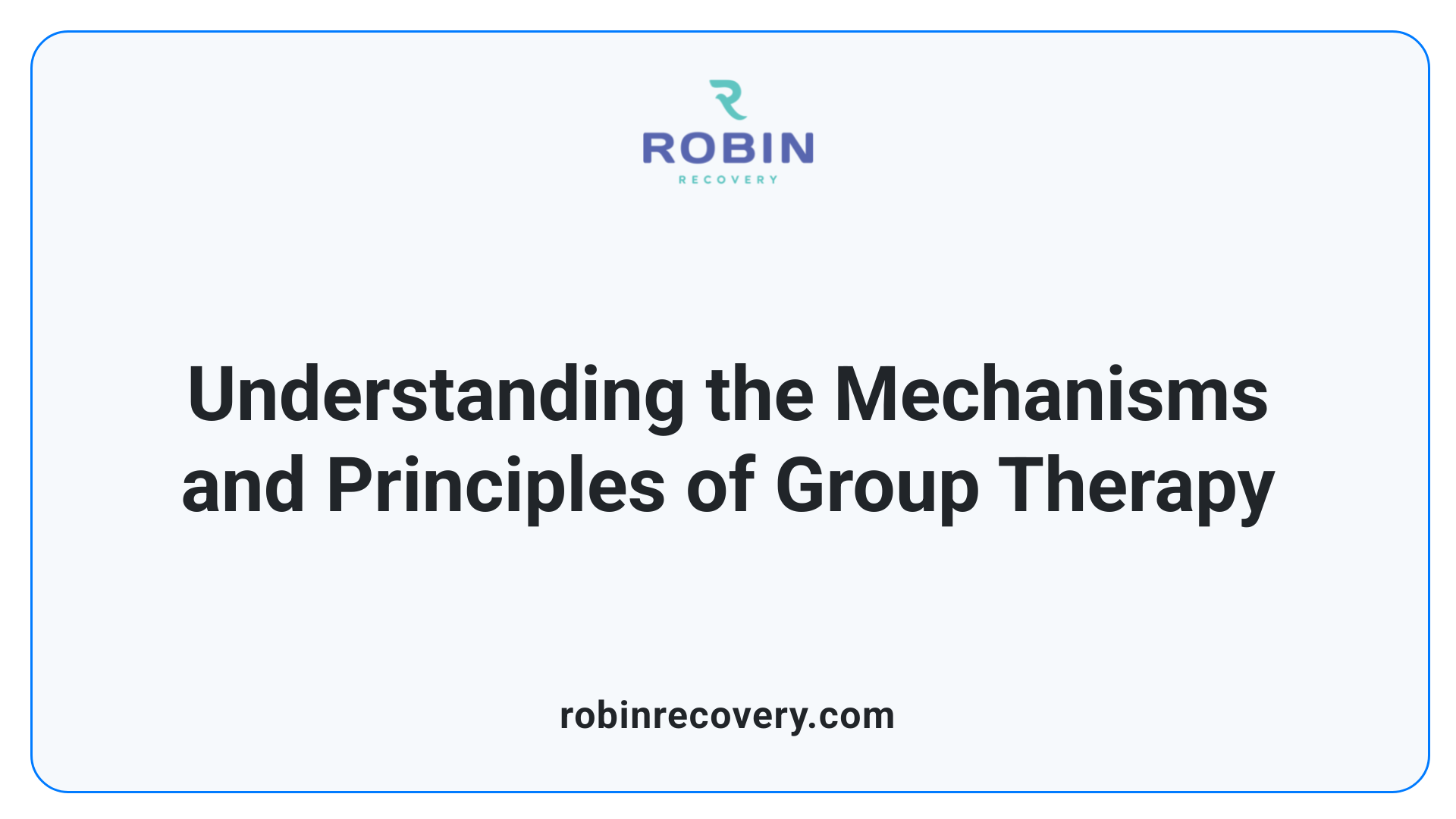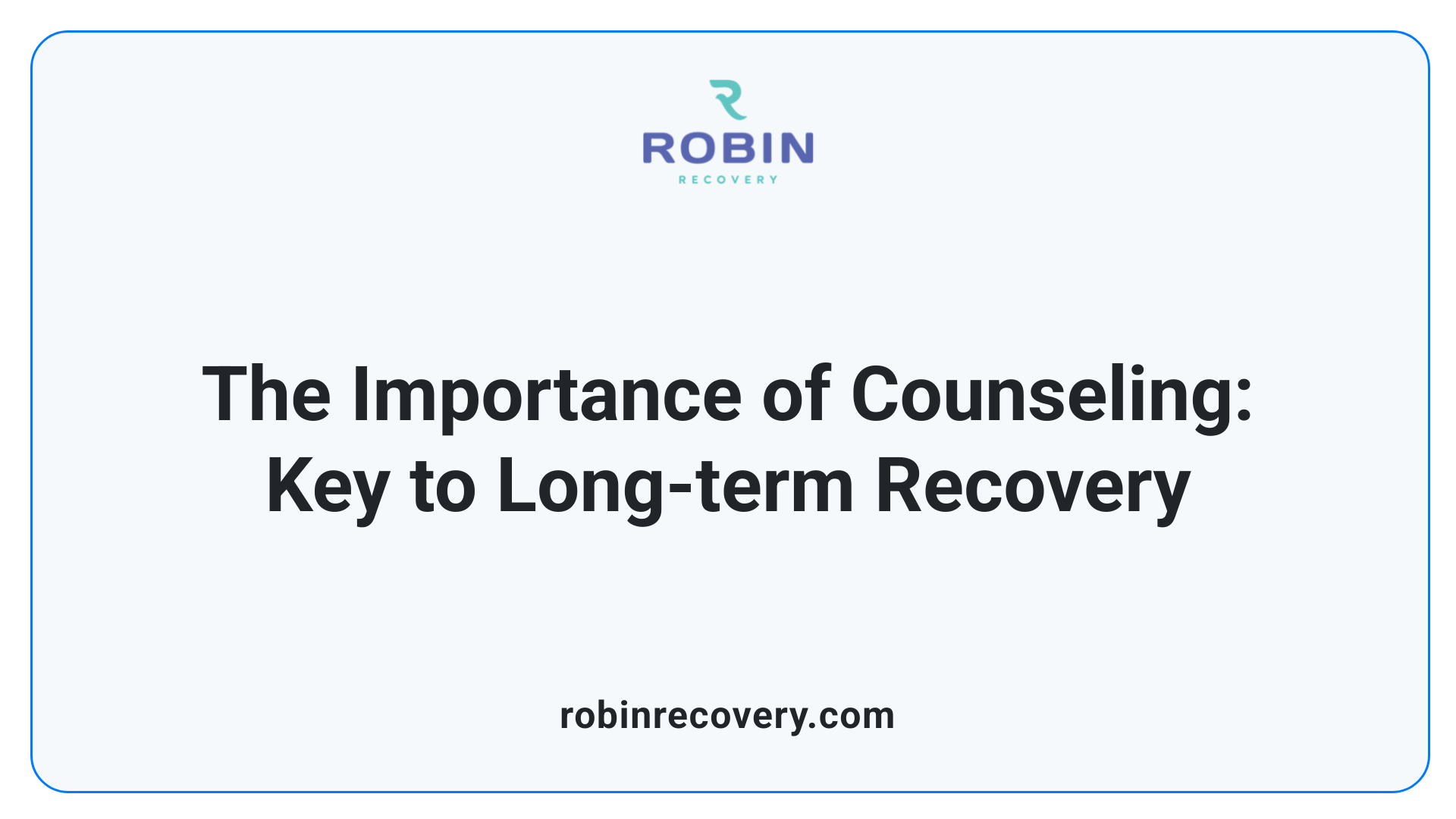How Group Counseling Enhances the Recovery Process

Introduction to Group Counseling
Group counseling, a form of psychotherapy conducted with multiple clients simultaneously, plays a vital role in the recovery process for individuals dealing with mental health issues and substance abuse disorders. It is recognized not only for its therapeutic effectiveness but also for its ability to provide an accessible and supportive environment conducive to healing and personal growth. As we delve deeper, this article will explore the manifold benefits of group counseling, its mechanisms, and its impact on recovery processes.
Benefits of Group Therapy

What are the benefits of group therapy?
Group therapy provides a multitude of benefits for individuals seeking recovery from mental health challenges and addictions. One primary advantage is its effectiveness; it has been shown to treat various psychological disorders—such as anxiety, depression, and PTSD—at rates comparable to those achieved through individual therapy. This makes it a practical option for many clients in need.
Furthermore, group therapy fosters a strong sense of belonging and universality among participants. Members gain comfort in realizing they are not alone in their struggles, significantly reducing feelings of isolation and shame. This shared experience is pivotal in promoting empathy and understanding within the group.
How does group therapy compare with individual therapy?
While both therapy types offer unique benefits, group therapy adds a layer of interpersonal connection that individual sessions might lack. Participants benefit from diverse perspectives shared among group members, enabling them to learn new coping strategies and gain insights from others.
Additionally, group therapy enhances emotional resilience by allowing clients to observe and support one another's journeys. The accountability created within a group dynamic encourages individuals to remain committed to their recovery goals. Plus, because group therapy sessions are more cost-effective than individual therapy, they are more accessible—especially for underserved populations.
What is the impact of group therapy on mental health disorders?
The impact of group therapy extends to improving interpersonal relationships and social skills, which are essential for maintaining long-term recovery. Participants cultivate hope, gratitude, and altruism, all of which significantly boost psychological well-being.
Healing from mental health disorders often involves addressing feelings of shame and stigma, and group sessions provide a safe environment where members can communicate openly about their challenges. This supportive atmosphere promotes personal growth, leading to a stronger sense of community among individuals who share similar experiences.
In summary, group therapy serves as a vital part of recovery strategies, combining support, shared experiences, and diverse insights in a structured setting.
Mechanisms and Principles of Group Therapy

What principles underpin group therapy techniques?
Group therapy techniques are underpinned by several core principles identified by Irvin D. Yalom, which include universality, altruism, and catharsis. These elements create a supportive environment where members can share their experiences, realizing that they are not alone in their struggles.
This recognition of shared experiences promotes universality, making individuals feel connected and validated.
- Altruism plays a crucial role as members help each other by offering support, which boosts their self-worth.
- Cohesion within the group fosters a sense of belonging, encouraging open communication and fostering therapeutic change.
As members interact, they develop essential interpersonal skills through feedback and shared learning, which significantly aids in personal development. Developing skills in active listening and constructive feedback enhances the recovery journey, allowing individuals to apply these skills beyond the group setting.
How do group dynamics influence therapy outcomes?
The dynamics within a group can significantly influence therapy outcomes. Cohesion among group members has been recognized as a critical predictor of success. When individuals feel collectively supported, they are more likely to engage in the therapeutic process.
Key aspects of group dynamics include:
Aspect Description Impact on Recovery Cohesion The bond among members creating a supportive network Encourages openness and vulnerability Communication Sharing thoughts and feelings in a safe environment Fosters trust and interpersonal skills Conflict Management Handling disagreements constructively Enhances coping skills and emotional resilience
Effective group leaders establish clear ground rules and promote a safe environment, allowing members to navigate conflicts constructively. This process helps individuals practice valuable skills that benefit their recovery and overall life situations. Together, these principles and dynamics contribute to a rich and therapeutic group experience, enhancing personal growth and fostering long-term recovery.
Role of Group Counseling in the Recovery Process
How does group counseling assist in the recovery process?
Group counseling plays a vital role in the recovery journey by creating a safe space where participants can share their experiences and emotions. Each session typically involves around five to fifteen members led by a trained therapist. This environment fosters mutual support, as individuals benefit from the comfort of knowing they are not alone in their struggles.
Sessions are designed to promote deeper self-awareness and emotional control by allowing individuals to explore how their past experiences influence their present challenges. This psychoanalytic approach can be particularly effective for those experiencing psychological distress, such as depression or anxiety, as it encourages patients to reflect on their interpersonal dynamics.
Regular weekly meetings are crucial for maintaining engagement and facilitating ongoing support. Participants learn valuable coping strategies from each other, which can significantly enhance their recovery process. The exchange of perspectives not only alleviates feelings of isolation but also builds a sense of community that is integral to sustained recovery.
What is the impact of social support and shared experiences in group therapy?
Social support is one of the primary benefits of group therapy, as it cultivates a nurturing environment that fosters accountability and motivation. Members share their struggles and victories, reinforcing the idea that recovery is a collective journey. Celebrating milestones together enhances the sense of belonging and reinforces positive behaviors among participants.
Moreover, the shared experiences in group therapy reduce stigma associated with mental health and substance use disorders. When individuals express their thoughts and feelings, they receive validation and feed off the encouragement from their peers. This camaraderie serves as both a comfort and a source of inspiration, often leading to newfound coping mechanisms that individuals can incorporate into their lives.
Overall, group counseling not only aids in individual recovery, but it also strengthens the bonds of support that are vital for lasting change.
Group Therapy for PTSD
How effective is group therapy for individuals suffering from PTSD?
Group therapy has shown significant promise in the treatment of PTSD, especially in addressing the isolation many individuals experience following traumatic events. By participating in group settings, members find valuable social support from peers who understand their struggles. This shared experience can help reduce feelings of loneliness and stigma associated with trauma.
The collaborative nature of group therapy offers emotional validation and encouragement, which are crucial in promoting recovery. Studies suggest that group-based treatments can lead to improved clinical outcomes for individuals with PTSD, as the therapeutic environment fosters a sense of belonging and connection.
Furthermore, participants often gain new perspectives on their experiences, enhancing emotional resilience and coping strategies. Group therapy plays a pivotal role in trauma recovery by not only addressing symptoms directly but also by creating a supportive community where healing can thrive.
Group Therapy in Depression Treatment
How is group therapy applied in the treatment of depression?
Group therapy is a powerful tool in treating depression, providing an environment where individuals facing similar challenges can connect and support one another. Various therapeutic approaches, such as cognitive behavioral therapy (CBT) and interpersonal therapy, are often incorporated into group sessions.
These approaches focus on helping participants develop essential coping skills, improve emotional regulation, and restructure negative thought patterns. Many participants report significant reductions in depressive symptoms after just a few sessions. This shared experience not only fosters personal growth but also alleviates feelings of isolation commonly associated with depression.
The essence of group therapy lies in its capacity to create a sense of belonging. Participants learn from each other’s experiences, which can enhance their understanding and management of their condition. This peer support is vital, as it nurtures a supportive network that reinforces the recovery process.
Benefits in depressive disorder management
The benefits of group therapy in managing depressive disorders are profound:
- Emotional Support: Participants receive emotional reassurance and validation from peers.
- Improved Social Skills: Group settings help members practice communication, enhancing their interpersonal skills.
- Reduced Isolation: Shared experiences reduce the stigma and loneliness associated with depression.
- Accountability: Group members encourage each other, fostering commitment to recovery and personal goals.
- Shared Learning: Exposure to diverse perspectives introduces members to new coping strategies and insights.
Overall, research indicates that group therapy can lead to clinically meaningful improvements in mood and well-being for individuals suffering from depression, making it a valuable component of treatment plans.
The Importance of Counseling for Long-term Recovery

Why is counseling crucial for long-term recovery?
Counseling is crucial for long-term recovery as it provides a supportive framework that addresses the multifaceted nature of addiction recovery. It not only facilitates healing but also equips individuals with essential strategies to maintain sobriety. Here are some key reasons why counseling is vital:
- Support System: Counselors offer emotional and psychological support, creating a safe space for individuals to express their struggles and experiences.
- Resource Connection: Effective counselors connect clients to vital resources related to health, housing, purpose, and community, which are instrumental for recovery.
- Lifestyle Development: Through counseling, clients learn to develop healthy lifestyles, including effective coping strategies and new techniques for managing triggers and stress.
- Goal Orientation: Counselors help individuals set recovery goals and foster a sense of purpose through engaging activities and meaningful connections.
What role do counselors play in recovery?
Counselors play a multifaceted role in the recovery journey, impacting various aspects of the individual's life. They are instrumental in facilitating the recovery process by:
- Building Connections: By helping clients form social connections and support networks, counselors reduce feelings of isolation often associated with addiction.
- Encouraging Accountability: Counselors instill a sense of accountability in clients, encouraging them to commit to their recovery goals while providing motivation and feedback.
- Skill Development: Through counseling sessions, individuals learn essential life skills, including communication and interpersonal skills, vital for maintaining healthy relationships post-treatment.
- Holistic Approach: Counselors integrate various therapeutic modalities—such as cognitive-behavioral therapy and mindfulness—tailored to the unique needs of each client, enhancing overall treatment efficacy.
- Addressing Relational Issues: They address potential relational problems linked to substance use, guiding clients toward healthier patterns of interaction.
By combining support, accountability, and skill development, counseling immensely contributes to long-term recovery success.
Common Formats and Activities in Group Therapy
What are examples of group therapy sessions and their formats?
Group therapy sessions come in various formats but commonly host about 8 to 12 participants on a weekly basis. The types of sessions can include:
- Cognitive Behavioral Groups: Focuses on altering dysfunctional thought patterns.
- Psychoeducational Groups: Aims to educate members about mental health issues.
- Support Groups: Provides a safe space for sharing experiences and emotional support.
Sessions typically begin with warm-up activities, such as icebreakers or narrative storytelling exercises, to help foster connection among members. The session structure often consists of three phases:
- Introduction: Establishes the purpose and goals of the session.
- Goals-focused middle phase: Encourages sharing experiences, setting goals, and discussing personal progress.
- Closing phase: Reflects on accomplishments and areas for further development.
What activities and exercises are common in group therapy?
Group therapy incorporates several activities that promote healing and growth, including:
- Sharing Personal Stories: Members recount their experiences to foster empathy and understanding.
- Role-playing Exercises: Enables participants to practice social skills in a safe environment.
- Guided Discussions: Focuses on coping strategies and emotional expressions.
- Mindfulness Techniques: Helps individuals manage stress and enhance self-awareness.
- Feedback Sessions: Allows members to reflect on insights gained from peers.
These activities are designed to enhance interpersonal relationships, develop coping strategies, and improve communication skills among group members, ultimately supporting their individual recovery journeys.
Stages of Group Therapy
What are the four stages of group therapy?
Group therapy typically unfolds in four distinct stages, each critical to fostering a supportive and effective therapeutic environment.
- Initial Stage: In this phase, group members focus on establishing trust and defining roles. They set goals for the group and discuss expectations, including the importance of confidentiality and respect. This foundational work is vital as it lays the groundwork for an open and safe sharing environment.
- Transition Stage: During this stage, members often experience anxiety and defensiveness as they begin to share personal stories. The therapist plays a crucial role in facilitating discussions, ensuring that everyone feels safe and supported. Encouraging members to express their concerns nurtures a sense of cohesion within the group.
- Working Stage: This is where the magic happens. Members dive deeper into personal issues, fostering emotional exploration and honest communication. They learn to share insights and provide feedback, which is integral for personal growth and understanding. The working stage enhances accountability as participants see the value in supporting one another.
- Final Stage: In the final stage, members reflect on their experiences and achievements during the therapy journey. This stage emphasizes feedback, allowing individuals to articulate their learning and insights. Closure is essential here, as it helps reinforce the skills acquired and the connections formed, providing a smooth transition back to their daily lives.
Understanding these stages is essential as it equips individuals to navigate their therapeutic journey effectively, enhancing their recovery experience.
Defining Group Therapy
What defines group therapy?
Group therapy is defined as a form of psychotherapy that brings together a group of individuals—typically ranging from five to 15—under the guidance of one or two trained therapists. This collaborative approach allows participants to address various psychological issues, including common challenges like depression, anxiety, and substance abuse.
In a supportive environment, members share personal experiences, fostering an atmosphere of connection and understanding. This dynamic not only enhances self-awareness but also encourages the development of coping skills through peer interactions. Group therapy targets specific problems while also promoting general emotional healing and improved social skills.
Recognized by the American Psychological Association, group therapy is valued for its effectiveness and cost efficiency, making it a practical option, particularly in underserved areas where mental health resources may be limited. Its accessibility helps bridge gaps in care, offering crucial support for those experiencing mental health challenges.
What are the role and benefits of group therapy?
The role of group therapy extends beyond just the therapeutic dialogue facilitated by trained therapists. It thrives on the collective support of peers who share similar struggles, which can significantly enhance the recovery process. The benefits encompass:
- Peer Support: Participants often find solace in the shared understanding of their challenges, helping reduce feelings of isolation
- Accountability: The group setting encourages commitment to recovery goals, with members motivating each other to remain engaged
- Diverse Perspectives: Hearing different viewpoints on shared issues encourages personal growth and adaptive coping strategies
- Skill Development: Group therapy provides a platform for individuals to practice social skills and improve their communication in a safe environment
Through these elements, group therapy fosters a sense of community and connection, essential for healing during the recovery journey.
Addressing Misconceptions About Group Counseling
Common Myths
Group therapy is often surrounded by misconceptions that may discourage individuals from seeking its benefits. One common myth is that group therapy is only for those who are severely disturbed or experiencing crises. In reality, people from all walks of life can benefit from group therapy as it addresses a range of issues including addiction, anxiety, depression, and relationship problems.
Another misconception is the belief that privacy is compromised in group settings. While participants do share their experiences, trained therapists create a safe environment emphasizing confidentiality, trust, and respect among group members.
Realities of Group Therapy
In truth, group therapy fosters a unique support network. It reduces feelings of isolation by connecting individuals facing similar challenges, promoting openness and understanding. Participants often find that hearing others' experiences works to normalize their own struggles, leading to increased self-awareness and shared healing.
Moreover, group therapy is recognized for its effectiveness, with many studies indicating outcomes comparable to those achieved in individual therapy. It provides diverse perspectives that enhance coping skills and can promote accountability and motivation among members. This collaborative approach is especially beneficial for those seeking community support in their recovery journey.
Future Directions and Emerging Trends in Group Therapy

Integration with Technology
The future of group therapy is increasingly intertwined with technology. Virtual group therapy has gained acceptance, providing flexible access to support networks. Teletherapy platforms enhance engagement, making it possible for participants to connect regardless of geographical barriers. Researchers continue to study the effectiveness of online sessions, finding that they can yield outcomes comparable to traditional face-to-face meetings. As digital tools evolve, therapists might integrate apps facilitating real-time feedback and communication, promoting ongoing group interactions between sessions.
Innovative Practices
In addition to technological advancements, innovative practices within group therapy are emerging. Approaches like mindfulness-based group therapy and experiential techniques that tap into emotional and physical wellness are being explored. These methods not only address coping mechanisms but also promote holistic healing by acknowledging the interconnectedness of mental and physical health. Furthermore, therapists are focusing on culturally sensitive practices, ensuring that the diverse needs of participants are respected and catered for, thereby improving therapeutic outcomes.
TrendDescriptionPotential Impact Integration with Technology Use of virtual platforms for seamless group integration Increased accessibility and convenience for clients Innovative Practices Incorporation of holistic techniques and culturally sensitive methods Enhanced emotional resilience and relevance in diverse settings
Conclusion: Embracing the Group Counseling Journey
Group therapy stands as an effective and empowering approach in the recovery process. By providing a unique platform for shared experiences and learning, it helps individuals connect, grow, and heal. As an essential component of modern therapeutic practices, group counseling offers not only cost-effective solutions but also the gift of community and belonging, which is invaluable for anyone on the road to recovery. Embracing group therapy can mean the difference between struggling alone and finding strength in solidarity.
References
- Group Therapy - StatPearls - NCBI Bookshelf
- How Group Therapy Enhances Addiction Recovery
- How Group Therapy Enhances Accountability in Recovery - Carrara
- 1 Groups and Substance Abuse Treatment - NCBI
- How Group Therapy and Peer Support Enhance Recovery
- [PDF] Group Therapy In Substance Use Treatment - SAMHSA Publications
- The Vital Role of Group Therapy in Mental Health Recovery
- How Individual and Group Therapy Strengthens Addiction Recovery
- The Power of Group Therapy: Healing Through Shared Experiences
